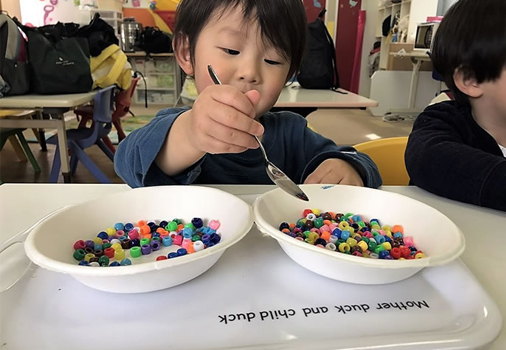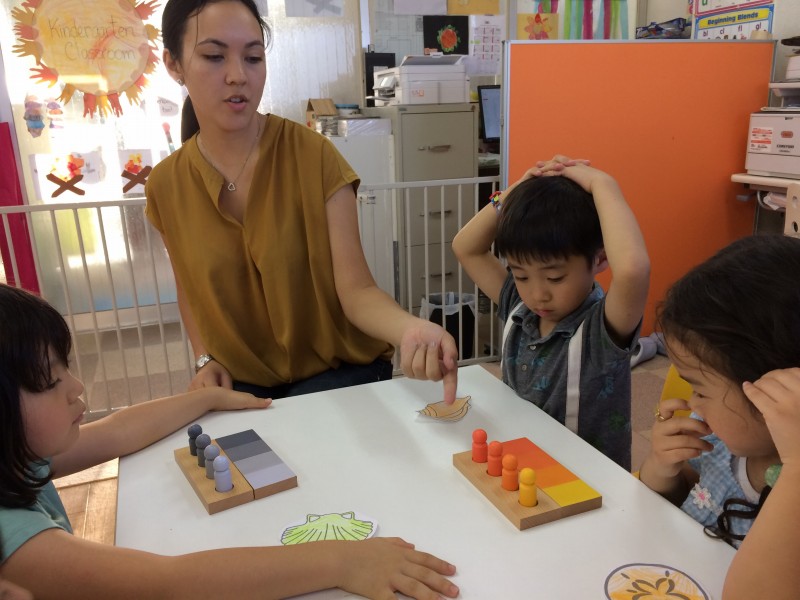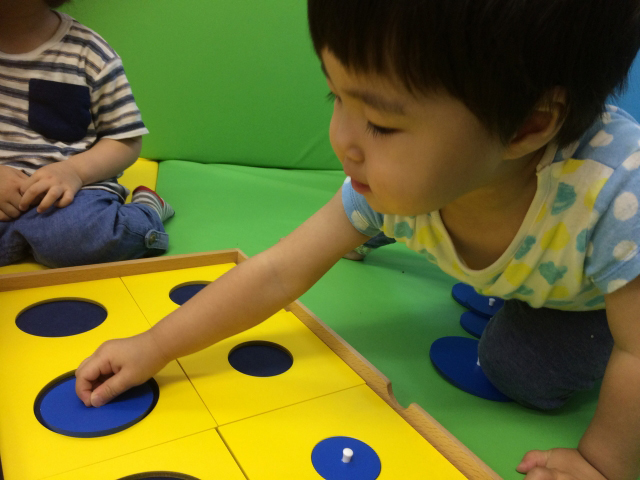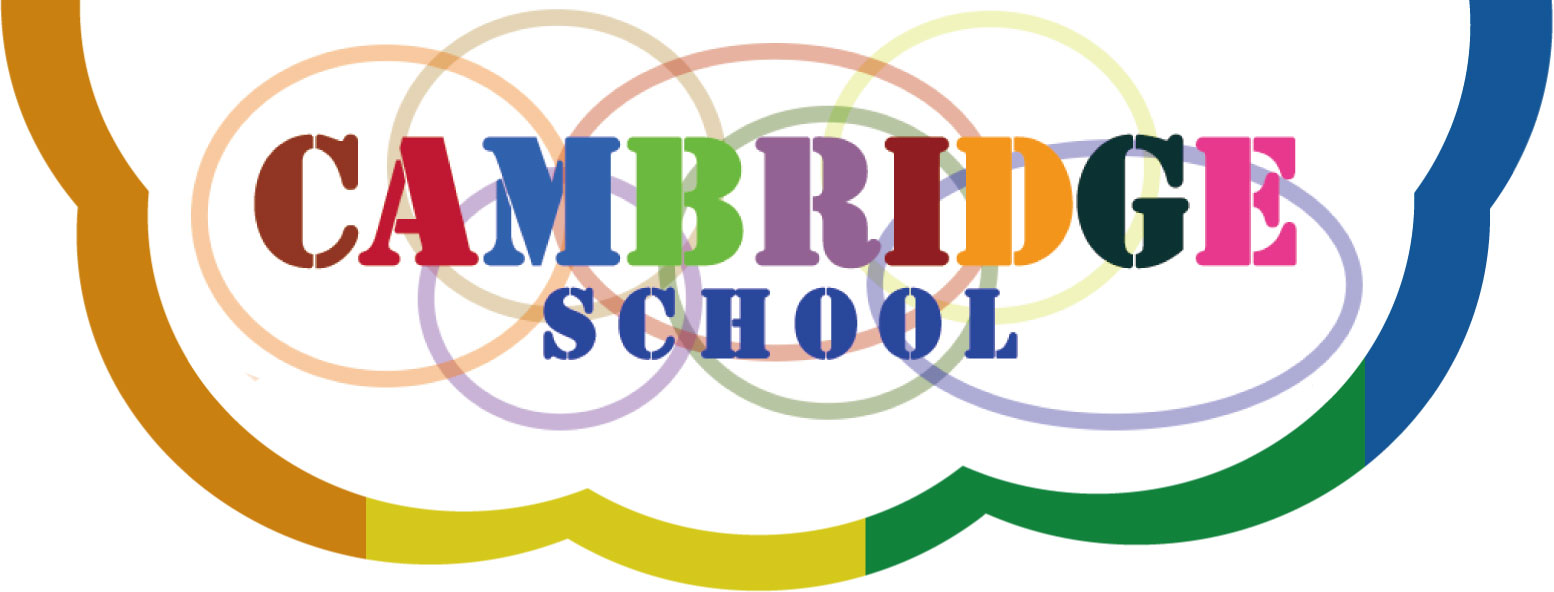Montessori Method
About the Montessori Method
“Do it like this. Do it like that. Do it faster!”
When taking care of your child, you might say things like that without thinking.
You want to watch over them and give them time, but it can be difficult.

How time passes can feel different for adults and children. Before you say anything to your child, take a deep breath and just watch over them. See what your child is trying to do and observe to find out what kind of help they might need.
Children are sensitive with their five senses at a young age and they are using all those senses to help themselves grow. Let’s believe in them and wait for them.
Just because things will get dirty or they’re not doing it correctly, if adults get in their way and stop them from something they’re absorbed in doing, you are missing out on chances for children to learn and grow.
That’s not saying you should leave them completely alone. Adults should watch over children when they’re doing things they want to do, but when there is something they want to know, show them in an easily understood way.
When you do that, children will gladly try to do it again and again themselves. When they do so successfully, children will be satisfied and happy. It shows how important it is in what ways adults should interact with children.
“Help me to do this on my own!” That’s the wish of children. And that is what the Montessori Method is about.
Practical Life
The Practical Life area of the Montessori environment has some basic goals. The activities found in this area of the classroom provide real life experiences for children.
The exercises in Practical Life provide purposeful life activity, develop motor control and coordination, develop independence, concentration, and a sense of responsibility.

Such skills include learning to button and zip one’s coat for example, or tying one’s shoelaces or snapping closed fasteners. Other activities include hand washing and cleaning up, baby doll washing and grooming that help express caring for others.
Under the area of caring for the environment are exercises such as pouring, spooning, sweeping, cloth folding, dish washing, and taking care of animals and plants. Exercises in grace and courtesy consist of things such as walking, sitting, greeting others, manners (please, thank you, and "May I"), how to interrupt a teacher or another child ("Excuse me" and tapping a teacher on the shoulder and waiting to be responded to), passing objects, following directions, how to open and close a door, and control of body through silence games.
Sensorial
Montessori believed that nothing comes into the mind except through the senses. As children develop their senses their attention is directed toward their environment.
The purpose then of the Sensorial activities is to help the child in his efforts to sort out the many varied impressions given by the senses. These materials are specifically designed to help the child develop discrimination, order, and to broaden and refine the senses as well help prepare him to be a logical, aware, and perceptive person.
In the mathematics classroom, students engage in historically established mathematical discourse with their classmates and the teacher. In so doing, their thinking undergoes change as they establish the reasons and rationale for using such discourses within the mathematics community.
Student’s increasingly sophisticated use of mathematical discourse engagement is allied to their increased sensitivity to opportunities for using those observations, associated techniques and ways of thinking. Thus the routines they invoke; how to look, how to calculate, how to use words, how to endorse, how to define, etc., increase student’s opportunities for solving evermore complex problems.


Cultural
The Cultural area of the Montessori classroom covers a variety of subjects. Geography, Science, Botany, Zoology and History are included. Art and Music are also considered a part of the Cultural Area of the classroom. History is covered in greater detail as the children progress through to the elementary part of the school.
During the year subjects discussed in Geography are things such as; land, air, and water, maps, continents, people, food and music from other countries.
Unit studies in science include subjects such as the different seasons, the five senses, why leaves change colour, layers of the earth, parts of a volcano, and biomes of the earth. Simple science experiments are included as well.
Zoology is the area where the focus is learning about animals. Included are the five classes of vertebrates and invertebrates are discussed including insects, worms, and spiders. In Botany, seeds, parts of a plant, kinds of trees, herbs and spices, and what plants give us, are some of the unit studies discussed.
The Prepared Environment
Montessori believed that children learn best in a prepared environment, a place in which children can do things for themselves. The prepared environment makes learning materials and experiences available to children in an orderly format.
Classrooms Montessori described are really what educators advocate when they talk about child-centred education and active learning. Freedom is the essential characteristic of the prepared environment.
Since children within the environment are free to explore materials of their own choosing, they absorb what they find there. The key is in creating environments for young children that enable them to be independent, active, and learning.

The Prepared Environment
| Montessori Outdoors | Montessori at Home |
|---|---|
|
|
|

 Montessori emphasizes our freedom to inquire
Montessori emphasizes our freedom to inquire
To guide and cultivate the child's natural desire to learn
Our Montessori tasks emphasize children's capacity to engage independently and with freedom to inquire and explore their natural psychological, physical, and social worlds.
Contact Us
Cambridge School

Either Japanese or English is acceptable
Weekdays from 9:00 a.m. to 6:30 p.m


